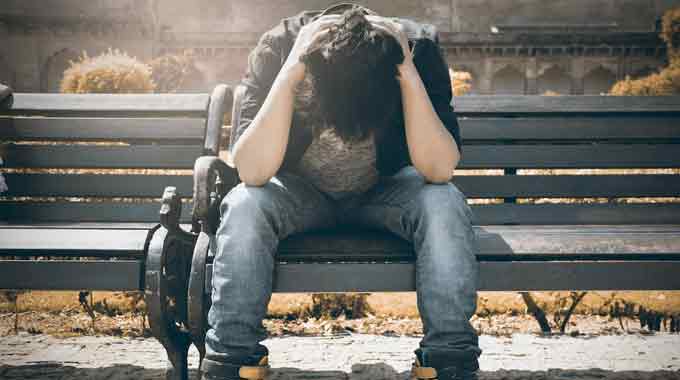Psychotic depression, also sometimes referred to as major depressive disorder with psychotic features, is a form of depression. Individuals who have this condition may experience the common symptoms of depression along with hallucinations and delusions.
Some symptoms of this mood disorder can be distressing and isolating to live with. In particular, psychotic features such as hallucinations and delusions can lead people to feel alone in the world and sometimes lead to suicidal ideation or acts.
Here we are going to look at some of the symptoms associated with the condition, how it differentiates from other mental illnesses, and some appropriate treatment options.
If you, or someone you know, is experiencing psychotic episodes, seek professional medical advice right away.
What Are the Symptoms of Psychotic Depression?
Somebody experiencing depression with psychotic features will have the common symptoms of depression, such as:
- Low mood
- Loss of interest in things previously enjoyed
- Exhaustion
- Isolation
- Anxiety
- Insomnia
- Weight and appetite changes
- Feelings of guilt and shame
- Poor concentration
Additionally, they may also begin to lose touch with reality. The American Psychiatric Association's Diagnostic and Statistical Manual states that they will experience some of the following symptoms:
- Hallucinations - hearing or seeing things that aren't there in reality
- Delusions - being convinced of things that aren't true
- Disordered and disorganized thinking
- Extreme anxiety and paranoia
Hallucinations and delusions in individuals who experience psychosis commonly revolve around certain themes and emotions. These vary from person to person but could include feelings such as shame, guilt, worthlessness, and isolation.
Hallucinations might be based on hearing a voice that tells them something such as that they are alone in the world and they will never achieve their goals. Delusions could be based on beliefs that everybody in their life will leave them and they will be left alone.
Relationship Breakdown
It's common for relationships to be damaged through the experience of psychosis. This can be to do with a lack of understanding of how to manage the condition, or sometimes the individual believing they are burdening their loved ones, or that they are unwanted or unloved.
Unfortunately, this can further deteriorate the mental wellness of the individual living with depressive symptoms.

Varying Degrees of Psychotic Depression
It is possible for some people with psychotic depression not to experience hallucinations, rather they might commonly have delusional thoughts and beliefs of a very depressive or anxious nature. Somebody may believe for example they are constantly at risk of losing their job, friends, or family. Other people may constantly fear that they are ill or dying.
However, there is an important distinction to be made between other disorders such as anxiety, obsessive-compulsive disorder, and psychotic depression. In the latter individuals are likely to feel severe depression in conjunction with psychotic symptoms.
What Causes Psychotic Depression?
Major depression with psychotic symptoms is a severe and complex condition. Understanding the cause can be complex, and as with most mental illnesses, there are often a number of factors contributing to its development. Below we look at some of these factors:
- Co-existing mental illness – if you have a pre-existing mental health condition, or you have a history of mental illness, this can increase your risk of developing the condition.
- Genes – it's thought that there is a genetic predisposition to developing psychotic depression, meaning that if a family member has the condition you may be more susceptible to developing it too.
- Gender – research has found that women are more likely than men to experience psychotic depression. This is thought to be related to the hormonal changes experienced by women, making them more susceptible to major depression.
- Trauma or stress – Experiencing severe stress or trauma, from things like violence, death, or physical injury, can put you at increased risk of developing the condition.
- Physical, Sexual, or Emotional Abuse – If you experienced early childhood abuse your likelihood of developing mental disorders is higher.
- Age - Individuals are more likely to develop major depressive disorder with psychosis as they get older, some people develop the condition in their 70s or 80s.
How is Psychotic Depression Diagnosed?
The American Psychiatric Association Diagnostic and Statistical Manual (DSM-5) considers psychotic depression as the presence of major depression, alongside psychotic symptoms. Within this, delusions and hallucinations can vary widely in theme but it is common for them to have a negative, violent, or catastrophic theme.
If you display the symptoms above, your doctor may perform a verbal and physical assessment to ascertain the degree of your symptoms and to better understand your medical history. This can help to provide information and diagnose you accurately. Additionally, it can add information about the severity of your case.
Sometimes other tests, such as blood tests and brain scans, will be done to rule out any other conditions.
Unfortunately, many people living with psychotic depression hide their symptoms of psychosis away, fearing that they may be judged or rejected for their thoughts. This can lead to worse outcomes due to the build-up of isolation, loneliness, and fear.
How Is Psychotic Depression Treated?
There are a number of ways of treating psychotic depression, depending on the specific needs of the individual. Each case is different and it's important to discuss the options with somebody you trust.
Some people respond well to medication, which usually takes the form of antidepressant and antipsychotic medications. This is the least invasive method of treatment and can enable people to continue with their lives with much less interference from symptoms.
Other people may choose to have electroconvulsive therapy (ECT). ECT is a treatment where small electric currents are passed through the brain, triggering very short seizures. This procedure is done under a general anesthetic.
ECT can cause changes to the brain chemistry which can reduce the effects of mental illness, including depression symptoms. Research has found that ECT is beneficial in relieving symptoms of major depressive disorder, but has higher success rates which occur earlier in people with psychosis than in nonpsychotic depression.
Electroconvulsive therapy is often used to avert the side effects of antidepressant medication, particularly in those who have not responded well to medication. Additionally, some people benefit from combination therapy - ECT, medication, and talk therapy.
Does Treatment for Psychotic Depression Work?
With all serious mental disorders, medical intervention from experts is needed when considering treatment. There are various safe and effective treatment options but it's important you remain under supervision from your doctor during the process.
Some people who use the medication form of treatment need to take a fairly long course of treatment to prevent symptoms from returning.
Any major depressive episode is likely to have a big impact on you and your life. You may need to take some time off work, reduce your responsibilities, and need extra support with everyday things. The good news is, with the right care and treatment, even very severe symptoms can be reduced and you can be back to a fulfilling life.
It's important to note that there is a higher risk of suicide for individuals living with severe clinical depression with psychotic features. If you or somebody you know is suffering, get in touch with a mental health professional. Engaging in talk therapy, joining community support groups, and caring for your mental well-being can complement the treatment methodology you choose.
Is There a Difference Between Schizophrenia and Psychotic Depression?
There are defined differences between major depression with psychotic features, schizophrenia, and bipolar disorder. Unfortunately, these conditions are sometimes categorized together which is unhelpful for those living with any of these disorders.
If someone experiences predominantly psychosis, without such a prominently depressed mood, it's likely they are experiencing schizophrenia. Individuals with schizophrenia will experience hallucinations and delusions that persevere. They may also have lowered cognition, numbed feelings, and loss of motivation.
It's more common for schizophrenia to develop when the individual is in their teens or early 20s, although psychotic depression can develop at any age and, as aforementioned, can even be seen for the first time in later life. Schizophrenia tends to be more long-lasting rather than episodic.
Bipolar disorder is a different condition, which can be categorized into three different types. This is a condition that results in severe changes to mood, energy, activity levels, and concentration, impacting the ability to regulate the individual's life.
It's important when we are talking about mental health to make clear distinctions between conditions, this can help us to understand treatment better, reduce stigma, and improve the lives of those affected.
GIA Miami Treatment for Psychotic Depression
Major depressive disorder with psychosis is indeed a serious mental illness that, without medical intervention, has the capability to cause serious harm.
At GIA Miami we truly understand that every case is different, and our treatment reflects this. We have flexible treatment plans which can be tailored to your specific recovery needs, hopes, and goals. Our team of medics and wellness experts offers an impeccable level of care to help you overcome your mental health condition.
Our treatment gives you the chance you deserve for a full recovery in order to continue living your best life. At our center, we offer a range of effective treatment methods to treat you in the most holistic way possible. These include the following:
- Cognitive-behavioral therapy (CBT)
- Transcranial magnetic stimulation (TMS)
- Family therapy
- Group therapy
- Psychiatric services
- Functional Medicine
Get In Touch Today
If you believe you or a loved one is living with psychotic depression, reach out to us so that we can better understand your circumstances and build a plan for your recovery. We are ready for your call.

